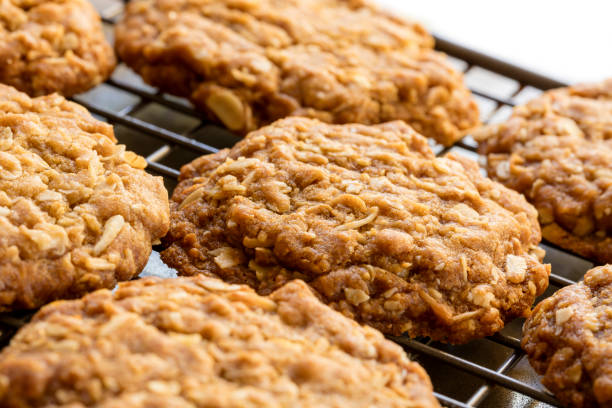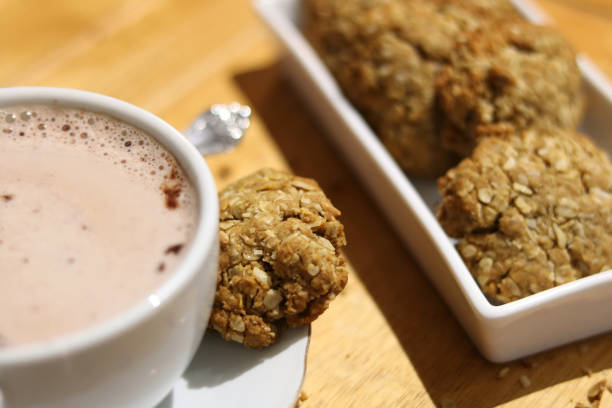Anzac biscuits, named in honor of the Australian and New Zealand Army Corps (ANZAC) soldiers of World War I, are a beloved treat in Australia and New Zealand. These biscuits, traditionally made with rolled oats, flour, sugar, butter, golden syrup, baking soda, boiling water, and desiccated coconut, have a rich history and cultural significance. They are known for their long shelf life, which made them ideal for shipping to soldiers overseas. Beyond their historical and cultural importance, Anzac biscuits offer a range of nutritional benefits. This essay explores the nutritional value of Anzac biscuits, highlighting their macronutrient composition, vitamins and minerals, and overall health benefits.

Anzac biscuits are primarily composed of carbohydrates, fats, and some protein. The key ingredients—rolled oats and flour—provide a substantial amount of carbohydrates. Carbohydrates are the body’s primary source of energy, making Anzac biscuits a good option for a quick energy boost. A typical Anzac biscuit contains around 60-70% carbohydrates, contributing to its role as an energy-dense snack.
The fats in Anzac biscuits come from butter and desiccated coconut. Butter provides saturated fat, while coconut contributes both saturated fat and medium-chain triglycerides (MCTs), which are metabolized differently and can provide a quick source of energy. Fats are essential for absorbing fat-soluble vitamins and supporting cell membrane integrity. The fat content in Anzac biscuits makes them satisfying and helps sustain energy levels over a longer period.

Protein in Anzac biscuits is relatively low, but it is present due to the oats and flour. Protein is vital for tissue repair, muscle maintenance, and overall body function. Although the protein content is not as high as in protein-rich foods, the presence of protein in Anzac biscuits contributes to their nutritional profile.
Anzac biscuits contain several essential vitamins and minerals, primarily due to the inclusion of rolled oats and desiccated coconut. Rolled oats are a good source of several B vitamins, including thiamine (B1), riboflavin (B2), and niacin (B3). These vitamins are crucial for energy metabolism, nervous system function, and the maintenance of healthy skin and eyes. Thiamine, for instance, is necessary for converting carbohydrates into energy, while niacin supports DNA repair and cellular function.

Additionally, oats provide minerals such as iron, magnesium, phosphorus, and zinc. Iron is essential for oxygen transport in the blood and energy production, helping to prevent anemia. Magnesium plays a vital role in muscle and nerve function, blood sugar control, and bone health. Phosphorus is important for the formation of bones and teeth, as well as energy production. Zinc supports immune function, wound healing, and DNA synthesis.
Desiccated coconut adds to the mineral content with significant amounts of manganese, copper, and selenium. Manganese is essential for bone formation, blood clotting, and reducing inflammation. Copper helps with iron absorption and the formation of red blood cells, while selenium acts as an antioxidant, protecting cells from oxidative damage.

Anzac biscuits made with rolled oats are a good source of dietary fiber. Fiber is essential for digestive health, as it helps regulate bowel movements and prevents constipation. It also contributes to a feeling of fullness, which can aid in weight management by reducing the likelihood of overeating. Additionally, dietary fiber helps lower cholesterol levels and reduce the risk of cardiovascular disease. The presence of both soluble and insoluble fiber in oats enhances the digestive benefits of Anzac biscuits.
Consuming Anzac biscuits in moderation can provide several health benefits. The complex carbohydrates from oats and flour provide a sustained release of energy, which is beneficial for maintaining energy levels throughout the day. This makes Anzac biscuits a suitable snack for individuals needing a quick energy boost, such as during mid-morning or mid-afternoon breaks.

The fats in Anzac biscuits, particularly those from coconut, provide essential fatty acids that support brain health and overall well-being. The medium-chain triglycerides (MCTs) in coconut are easily digestible and can provide a quick source of energy, which is particularly beneficial for athletes and active individuals.
The vitamins and minerals found in Anzac biscuits support overall health and well-being. For instance, B vitamins are essential for energy metabolism and brain function, while minerals like iron and magnesium are crucial for maintaining healthy blood and muscles. The presence of antioxidants, such as selenium from coconut, helps protect the body from oxidative stress and supports immune function.

While Anzac biscuits offer several nutritional benefits, it is important to consider their caloric content. Due to the inclusion of butter and sugar, Anzac biscuits are relatively high in calories. A typical Anzac biscuit contains around 150-200 calories, depending on the size and recipe. Therefore, moderation is key when consuming Anzac biscuits, especially for individuals managing their calorie intake or following a weight loss plan.
Anzac biscuits, with their rich history and cultural significance, are more than just a tasty treat. They offer a range of nutritional benefits, including essential vitamins, minerals, and dietary fiber. The carbohydrates provide sustained energy, while the fats and protein contribute to satiety and overall nutritional balance. While it is important to consume Anzac biscuits in moderation due to their caloric content, they can be a valuable addition to a balanced diet, providing a delicious and nutritious snack option. By enjoying Anzac biscuits, one can appreciate both their historical importance and their role in supporting a healthy diet.





Love the breakdown! It’s refreshing to see a no-fluff guide that actually helps casual players like me dive into scratch card games with confidence. For those looking to boost their game strategy, the AI Ad Generator is a must-try for smart, creative insights.